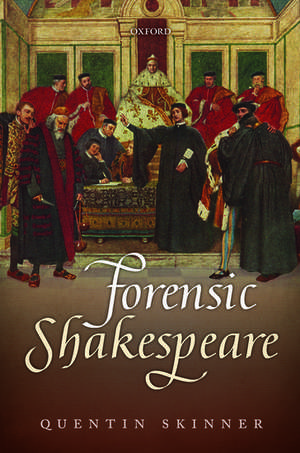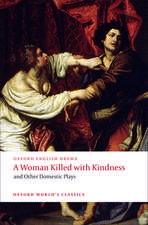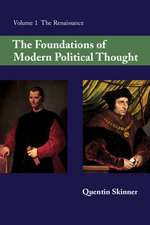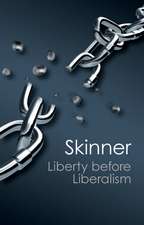Forensic Shakespeare: Clarendon Lectures in English
Autor Quentin Skinneren Limba Engleză Hardback – 30 oct 2014
| Toate formatele și edițiile | Preț | Express |
|---|---|---|
| Paperback (1) | 171.77 lei 10-16 zile | |
| OUP OXFORD – feb 2018 | 171.77 lei 10-16 zile | |
| Hardback (1) | 147.01 lei 31-37 zile | |
| Oxford University Press – 30 oct 2014 | 147.01 lei 31-37 zile |
Din seria Clarendon Lectures in English
- 8%
 Preț: 288.54 lei
Preț: 288.54 lei -
 Preț: 251.59 lei
Preț: 251.59 lei - 10%
 Preț: 267.51 lei
Preț: 267.51 lei - 8%
 Preț: 292.90 lei
Preț: 292.90 lei - 12%
 Preț: 288.05 lei
Preț: 288.05 lei - 34%
 Preț: 668.23 lei
Preț: 668.23 lei - 19%
 Preț: 345.89 lei
Preț: 345.89 lei - 14%
 Preț: 313.19 lei
Preț: 313.19 lei - 34%
 Preț: 525.75 lei
Preț: 525.75 lei - 8%
 Preț: 339.75 lei
Preț: 339.75 lei - 9%
 Preț: 321.79 lei
Preț: 321.79 lei - 10%
 Preț: 242.58 lei
Preț: 242.58 lei - 19%
 Preț: 288.99 lei
Preț: 288.99 lei - 13%
 Preț: 281.89 lei
Preț: 281.89 lei - 34%
 Preț: 991.05 lei
Preț: 991.05 lei - 14%
 Preț: 165.14 lei
Preț: 165.14 lei
Preț: 147.01 lei
Preț vechi: 157.78 lei
-7% Nou
Puncte Express: 221
Preț estimativ în valută:
28.13€ • 29.37$ • 23.28£
28.13€ • 29.37$ • 23.28£
Carte tipărită la comandă
Livrare economică 25-31 martie
Preluare comenzi: 021 569.72.76
Specificații
ISBN-13: 9780199558247
ISBN-10: 0199558248
Pagini: 368
Dimensiuni: 162 x 240 x 33 mm
Greutate: 0.68 kg
Editura: Oxford University Press
Colecția OUP Oxford
Seria Clarendon Lectures in English
Locul publicării:Oxford, United Kingdom
ISBN-10: 0199558248
Pagini: 368
Dimensiuni: 162 x 240 x 33 mm
Greutate: 0.68 kg
Editura: Oxford University Press
Colecția OUP Oxford
Seria Clarendon Lectures in English
Locul publicării:Oxford, United Kingdom
Recenzii
Forensic Shakespeare has all the qualities of erudition and lucidity one would expect from Quentin Skinner
This generous, helpful guide goes a long way towards explaining how Shakespeare's literary genius works
A magisterial, loving study of Shakespeare's infinitely varied use of the handbooks of judicial rhetoric shaping the thought of any Elizabethan (and us too, come to that).
a brilliant study of the teachings of classical legal rhetoric as used and misused by Shakespeare's speakers.
clear and convincing ... It's doubly impressive to imagine the book's own oratorical origins, since its later chapters now work so well as something so textual as an index of Shakespeare's uses of the five parts of a judicial speech.
exemplary scholarship.
a genuinely illuminating book and should be required reading for every serious student of [Shakespeare].
explores the idea that the Bard skilfully employed judicial rhetoric in the poem Lucrece and in some half-dozen of his most famous plays. A good one for Lawyers, Law students and anyone keen to sprinkle their dinner party conversation with some judiciously selected pearls of Shakespearean legalese.
the book is at its best on rhetoric and there is nobody better informed or more articulate on the subject of classical rhetoric than Skinner ... Skinner presents very engaging and detailed accounts of how judicial rhetoric develops through vernacular translations into a comprehensive language of performance and persuasion. There is no doubt that one of the greatest gifts of this book is the attention to the rhetorical texts themselves and their vigourous and learned analysis.
Skinner's book is a fascinating read, rich with instruction, analysis and suggestions for further study.
This generous, helpful guide goes a long way towards explaining how Shakespeare's literary genius works
A magisterial, loving study of Shakespeare's infinitely varied use of the handbooks of judicial rhetoric shaping the thought of any Elizabethan (and us too, come to that).
a brilliant study of the teachings of classical legal rhetoric as used and misused by Shakespeare's speakers.
clear and convincing ... It's doubly impressive to imagine the book's own oratorical origins, since its later chapters now work so well as something so textual as an index of Shakespeare's uses of the five parts of a judicial speech.
exemplary scholarship.
a genuinely illuminating book and should be required reading for every serious student of [Shakespeare].
explores the idea that the Bard skilfully employed judicial rhetoric in the poem Lucrece and in some half-dozen of his most famous plays. A good one for Lawyers, Law students and anyone keen to sprinkle their dinner party conversation with some judiciously selected pearls of Shakespearean legalese.
the book is at its best on rhetoric and there is nobody better informed or more articulate on the subject of classical rhetoric than Skinner ... Skinner presents very engaging and detailed accounts of how judicial rhetoric develops through vernacular translations into a comprehensive language of performance and persuasion. There is no doubt that one of the greatest gifts of this book is the attention to the rhetorical texts themselves and their vigourous and learned analysis.
Skinner's book is a fascinating read, rich with instruction, analysis and suggestions for further study.
Notă biografică
Quentin Skinner was born in 1940 and educated at Bedford School and at Gonville and Caius College Cambridge. He was elected a Fellow of Christ's College in 1962 and appointed to a Lectureship in the Faculty of History at Cambridge in 1965. Between 1974 and 1979 he was based at the Institute for Advanced Study at Princeton. Returning to Cambridge, he served successively as Professor of Political Science (1979-1996) and as Regius Professor of History (1996-2008).












